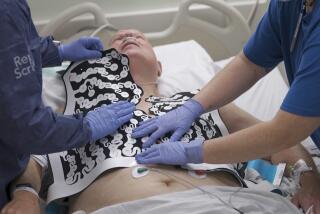New Enemy in Cardiac Care: Heart Failure
- Share via
Not so long ago, bad hearts usually killed quickly. But medical progress has changed that.
More and more, bad hearts kill slowly.
A generation of breakthroughs in heart care--the new medicines, the bypass operations, the angioplasties--have saved millions from swift and certain death from heart attacks and high blood pressure.
Now the beneficiaries of this care are living with the consequences: Their damaged hearts still beat, but not strongly enough.
The unintended result of better cardiac care is an unprecedented increase in a chronic, debilitating disease called heart failure. Some say it’s a virtual epidemic.
“Heart failure is a product of our success in dealing with heart disease and hypertension,” said Dr. Michael Bristow of the University of Colorado. “Patients don’t die catastrophically from these diseases but go on to develop something more insidious and subtle.”
This has also transformed heart failure, once a backwater of cardiac research, into a hot area of investigation. The goal is to understand the basics of what goes wrong and to translate this into new treatments. Already on the horizon are a variety of new drugs that may undo some of the damage of heart failure, implantable pumps that can give the heart a boost and operations that make it work more efficiently.
Heart failure is not what happens when the heart stops beating, as many people mistakenly believe. Rather, it is often a gradual ebbing of the heart’s power to pump blood and supply the body with oxygen.
It can be a slow, uncomfortable death. Because the heart fails to beat strongly enough to move blood properly, fluid seeps into body cavities, including the lungs, making breathing difficult. Sometimes victims wake up terrified because they cannot catch their breath.
Their legs and feet swell. They feel faint and dizzy. And because the body is getting too little oxygen, they are drained of energy.
An estimated 4.9 million Americans have heart failure--up from 3.4 million eight years ago. Eighty percent are over age 65.
Victims are often hospitalized repeatedly. Indeed, heart failure is the most common reason to be hospitalized. There are twice as many admissions for heart failure as for all cancers combined. And since one admission costs an average of $11,000, heart failure is the single most expensive item that Medicare covers.
Once symptoms develop, about three-quarters of the patients die within six years. According to the American Heart Assn., heart failure killed 43,000 Americans in 1995--double the 1980 number. Some estimate that it contributes to perhaps five times that many deaths.
“Hospitalization rates and mortality from heart failure are galloping forward at an unrestrained pace,” said Dr. James Young of the Cleveland Clinic.
Coronary artery disease and high blood pressure, complicated by the effects of aging, are the major underlying causes of heart failure.
The failing heart triggers a logical but ultimately ruinous cascade of hormones and chemicals as the body tries to compensate for its inadequate circulation.
“We now recognize that it may be the body’s response to the heart damage--not the damage itself--that kills people,” said Dr. Jay Cohn of the University of Minnesota.
One of these responses is adrenaline, the hormone that makes your heart work harder in times of stress. Although in short spurts this stimulation works fine, years of it actually destroy the heart.
Doctors long thought that a steady supply of adrenaline, though ultimately harmful, was essential to keep the failing heart ticking. Now, however, they are finding that blocking this hormone actually makes the heart improve.
Drugs that do this, called beta blockers, are already a mainstay of treating coronary artery disease. Studies involving about 13,000 patients are under way to see if beta blockers keep heart failure victims living longer.
The body also reacts to a failing heart as though it has been injured. One of its misguided repair attempts is production of a chemical messenger called tumor necrosis factor, or TNF. As with adrenaline, a short burst may be helpful, but constant exposure is a disaster, causing the heart to enlarge dangerously. Drugs that block TNF are being tested in heart failure patients and showing early promise.
Enlarging the heart is one of the body’s primary means of compensating when it cannot pump enough blood, but this eventually makes heart failure worse. One solution is to “shrink” the heart to a normal, efficient size with a scalpel, cutting out sections and then stitching it back together. Dr. Randas Batista amazed heart surgeons when he pioneered this operation four years ago in Brazil.
Among those who went to watch was Dr. Patrick McCarthy of the Cleveland Clinic. “We didn’t understand the science,” he said. “But what we did know is that sometimes it works.”
Some of Batista’s patients who were near death are now playing soccer. But no one kept track of how many improved or died.
McCarthy’s team in Cleveland has now done about 60 of the operations, the largest number in the United States. After one year, about 60% of the patients appear to be doing well. Still, these doctors caution against doing the operation routinely until they sort out why it works in some and fails in others.
The Batista procedure could be an alternative to a transplant, the last-ditch operation for heart failure. Because of a chronic shortage of healthy hearts, only about 2,300 transplants are done yearly, and experts say this is unlikely to increase much.
Another possibility is mechanical pumps, called left ventricular assist devices. Unlike the ill-fated mechanical heart, which entirely replaced the heart, these sit inside the chest and help the natural heart do its work.
Fewer than 1,000 mechanical pumps were implanted last year, exclusively to keep people alive while they awaited transplants.
“The survival of patients bridged in this way is truly remarkable,” sometimes up to 18 months, said Dr. Eric Rose of Columbia-Presbyterian Hospital in New York City.
Now doctors are studying whether the devices can be left in permanently. Within two or three years, they should know whether the devices prolong life and improve its quality.
Until these new approaches can be proven, many doctors say patients could be treated more effectively with current medicines. Three drugs are the mainstay of care: diuretics, which help relieve swelling; digitalis, which makes the heart contract more forcefully; and ACE inhibitors, which relax blood vessels, reducing the resistance to circulation.
ACE inhibitors, the newest addition, are widely considered the most important medicine for heart failure because they can actually slow its course. They are the least used, however.
Dr. John O’Connell of Wayne State University in Detroit said only about half of all heart failure patients are given ACE inhibitors, and half these are underdosed.
No one knows precisely why ACE inhibitors have taken so long to filter down to daily practice. But specialists say some doctors may feel it’s enough to relieve the symptoms of heart failure, which diuretics often do well, without trying to stall the relentless progression of the disease.






